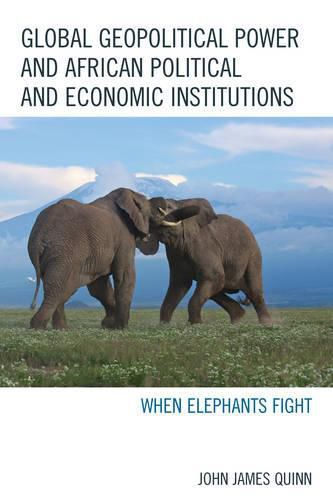Readings Newsletter
Become a Readings Member to make your shopping experience even easier.
Sign in or sign up for free!
You’re not far away from qualifying for FREE standard shipping within Australia
You’ve qualified for FREE standard shipping within Australia
The cart is loading…






Global Geopolitical Power and African Political and Economic Institutions: When Elephants Fight describes the emergence and nature of the prevailing African political and economic institutions in two periods. In the first, most countries adopted political and economic institutions that funneled significant levels of political and economic power to the political elites, usually through one- or no-party (military) political systems, inward-oriented development policies, and/ or state-led-and often state-owned-industrialization. In the second period, most countries adopted institutions that diluted the overarching political and economic power of ruling elites though the adoption of de jure multiparty electoral systems, more outward-oriented trade policies, and the privatization of many state owned or controlled sectors, though significant political and economic power remains in their hands. The choices made in each period were consistent with prevailing ideas on governance and development, the self-interests of political elites, and the perceived availability of support or autonomy vis-a-vis domestic, regional, and international sources of power at the time.
This book illustrates how these two region-wide shifts in prevailing political and economic institutions and practices of Africa can be linked to two prior global geopolitical realignments: the end of WWII with the ensuing American and Soviet led bipolar system, and the end of the Cold War with American primacy. Each period featured changed or newly empowered international and regional leaders with competing national priorities within new intellectual and geopolitical climates, altering the opportunities and constraints for African leaders in instituting or maintaining particular political and economic institutions or practices. The economic and political institutions of Africa that emerged did so as a result of a complex mix of contending domestic, regional, and international forces (material and intellectual)-all which were themselves greatly transformed in the wake of these two global geopolitical realignments.
$9.00 standard shipping within Australia
FREE standard shipping within Australia for orders over $100.00
Express & International shipping calculated at checkout
Global Geopolitical Power and African Political and Economic Institutions: When Elephants Fight describes the emergence and nature of the prevailing African political and economic institutions in two periods. In the first, most countries adopted political and economic institutions that funneled significant levels of political and economic power to the political elites, usually through one- or no-party (military) political systems, inward-oriented development policies, and/ or state-led-and often state-owned-industrialization. In the second period, most countries adopted institutions that diluted the overarching political and economic power of ruling elites though the adoption of de jure multiparty electoral systems, more outward-oriented trade policies, and the privatization of many state owned or controlled sectors, though significant political and economic power remains in their hands. The choices made in each period were consistent with prevailing ideas on governance and development, the self-interests of political elites, and the perceived availability of support or autonomy vis-a-vis domestic, regional, and international sources of power at the time.
This book illustrates how these two region-wide shifts in prevailing political and economic institutions and practices of Africa can be linked to two prior global geopolitical realignments: the end of WWII with the ensuing American and Soviet led bipolar system, and the end of the Cold War with American primacy. Each period featured changed or newly empowered international and regional leaders with competing national priorities within new intellectual and geopolitical climates, altering the opportunities and constraints for African leaders in instituting or maintaining particular political and economic institutions or practices. The economic and political institutions of Africa that emerged did so as a result of a complex mix of contending domestic, regional, and international forces (material and intellectual)-all which were themselves greatly transformed in the wake of these two global geopolitical realignments.